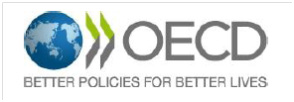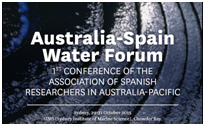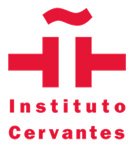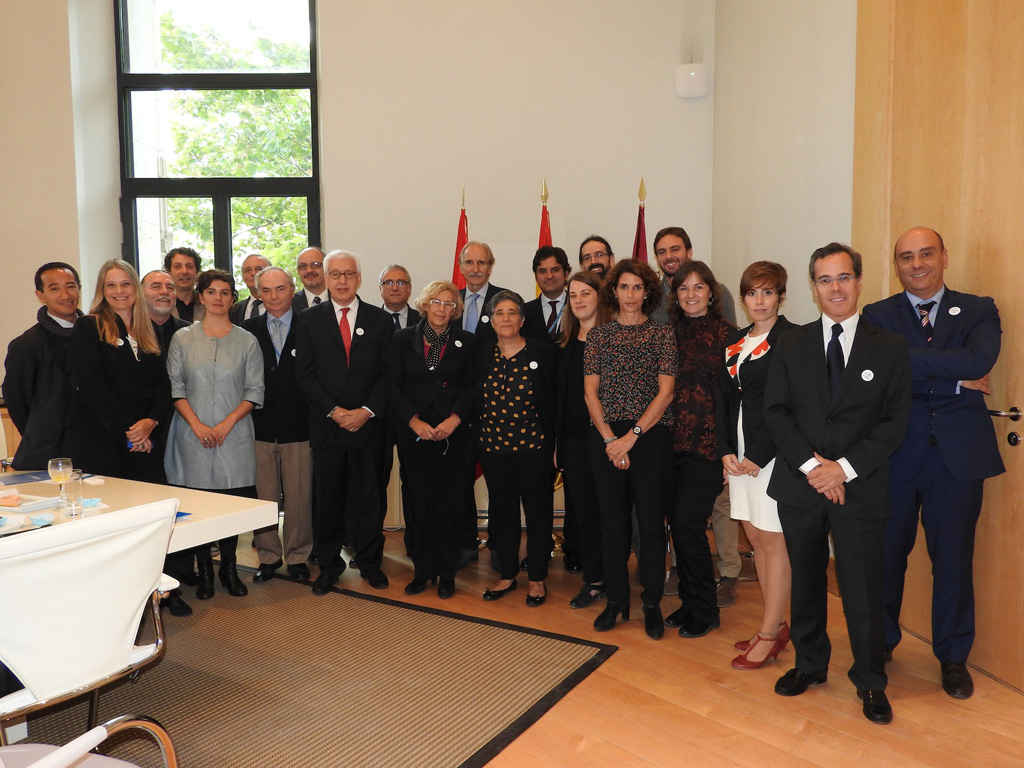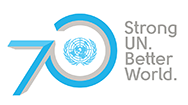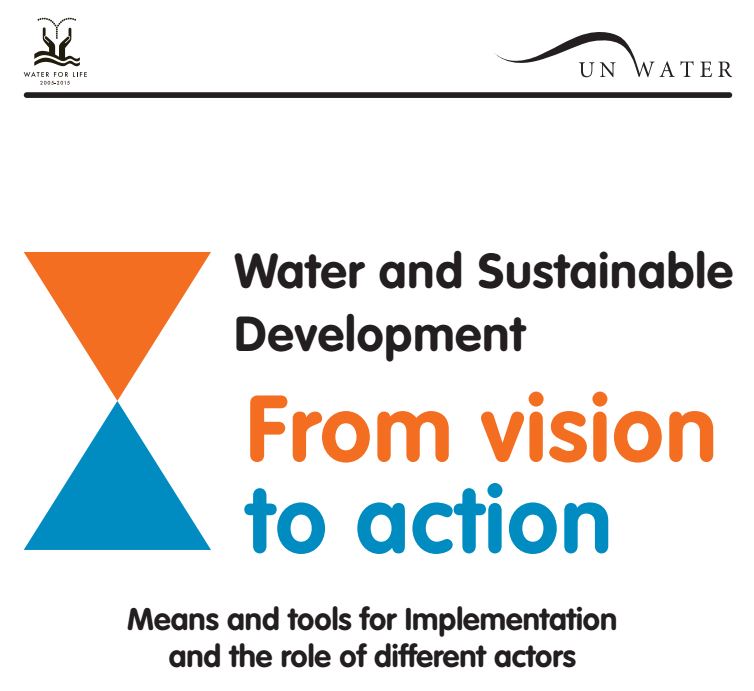- ON THE DECADE
- THE DECADE'S CAMPAIGN
- REPORTING ON PROGRESS
- THE DECADE'S PROGRAMMES
- FOCUS AREAS
-
- Access to sanitation
- Financing water
- Gender and water
- Human right to water
- Integrated Water Resources Management
- Transboundary waters
- Water and cities
- Water and energy
- Water and food security
- Water and sustainable development
- Water and the green economy
- Water cooperation
- Water quality
- Water scarcity
- FOCUS REGIONS
- RESOURCES FOR
- UN e-RESOURCES
UNW-DPAC: Zaragoza Conferences
2015
2015 UN-Water Annual International Zaragoza Conference. Water and Sustainable Development: From Vision to Action.
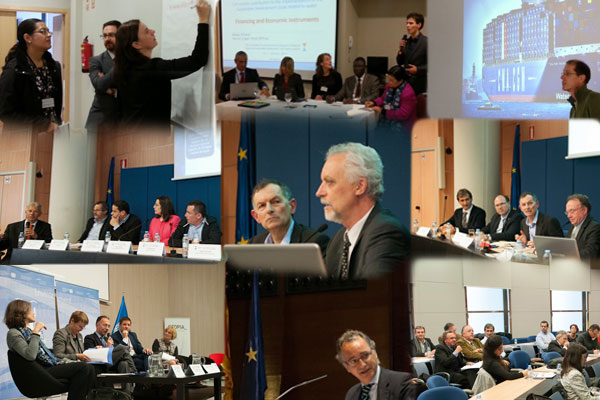
Date: 15-17 January 2015
Place: Zaragoza, Spain
The UN-Water Annual Zaragoza Conferences serve UN-Water to prepare for World Water Day. This conference is part of the road map for World Water Day 2015, which will focus on "water and sustainable development".
>> WELCOMING SPEECH by H.E. Mr. Sirodjidin Aslov, Minister of Foreign Affairs of the Republic of Tajik stan, to the participants of the UN-Water Zaragoza
>> Welcome video message by Michel Jarraud, UN-Water Chair, to the participants of the UN-Water Zaragoza Conference
>> Just Out!!!! Conference Report
>> Conference website
>> Press release summarizing main conclusions
2014
2014 UN-Water Annual International Zaragoza Conference. Preparing for World Water Day 2014: Partnerships for improving water and energy access, efficiency and sustainability
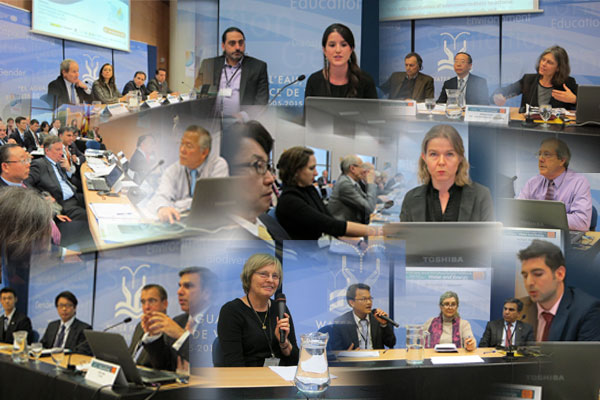
Date: 13-16 January 2014
Place: Zaragoza, Spain
In preparation for World Water Day 2014, this year focused on ‘Water and Energy’ issues, 9 UN Agencies and Programmes plus more than 120 experts, representatives for international companies in the water and energy sector, government and non-governmental organizations met in Zaragoza, Spain, to address the challenges, relationships and joint solutions that arise in ensuring access, efficiency and sustainability in the provision of water and energy.
Presentations, recordings of sessions and different information materials on water and energy are available on the Conference website.
>> Conference website
>> Press release summarizing main conclusions
2012/2013
International Annual UN-Water Zaragoza Conference 2012/2013 'Preparing for the 2013 International Year. Water Cooperation: Making it Happen!'
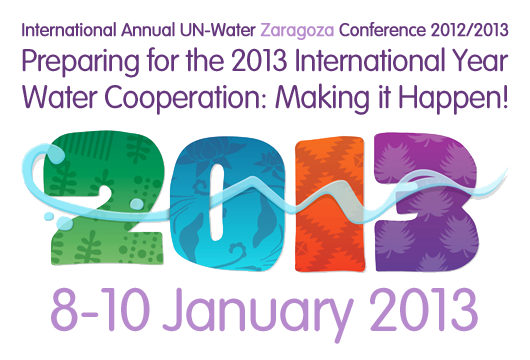
Date: 8-10 January 2013
Place: Zaragoza, Spain
In preparation of the 2013 International Year of Water Cooperation, and World Water Day 2013, the 2012/2013 Zaragoza International Annual UN-Water Conference focused on how to make water cooperation happen. The conference identified the best approaches to promote effective cooperation at different scales and how we can do 'better' in water cooperation through sharing lessons from experiences, and inspiring participants to do 'better'.
The conference introduced the key skills required for water cooperation, with particular attention to their important role in the process of negotiation and mediation and with examples of their application in national and international water settings.
The outcomes of the conference included:
- A series of documented case studies that illustrate how different tools and approaches for dispute resolution are implemented in practice;
- A synthesis of lessons learned on the use of approaches for dispute resolution and how to improve water cooperation;
- A feedback on the main messages for World Water Day 2013.
2011
3-5 October 2011: UN-Water International Conference. Water in the Green Economy in Practice: Towards Rio 2012. Zaragoza, Spain

"Successful water projects can serve as templates around the world and help to stimulate the adoption of green economies." The three-day UN-Water conference in Zaragoza, Spain, discussed examples of successful water projects as well as how to adequate manage the world's limited water resources. Experts predict that the amount of water needed by humans could exceed the amount available by as much as 40 per cent by 2030, making water management a priority in the sustainability agenda. Water is also closely linked to the green economy because it is interwoven with sustainable development issues such as health, food security, energy and poverty. The conference served as a preparation process for next year's UN Conference on Sustainable Development, known as Rio+20.
The event placed a special focus in showcasing already successful projects of how water can be a major contributor to developing a green economy. At the end of the conference, UN-Water issued a draft best practice guide to actions, instruments and policies to progress towards a green economy for sustainable development and poverty eradication.
2010
13-17 December 2010: Sustainable Water Management in Cities: engaging stakeholders for effective change and action. Zaragoza, Spain

Considering the theme selected for World Water Day 2011 ‘Water for Cities: Responding to the Urban Challenge’, the Municipality of Zaragoza, the United Nations Office to support the International Decade for Action ‘Water for Life’ 2005-2015/UN-Water Decade Programme on Advocacy and Communication, the SWITCH consortium and UN-Habitat organized an international conference which brought together key stakeholders to move forward the international agenda and share solutions for the sustainable management of water in cities. The conference was also an intermediary step in the preparation of World Water Day 2011.
A dedicated website offers daily updates from the conference and specific information for media.
>> Access the 'Sustainable Water Management in Cities' conference website
2009
3-4 December 2009: 1st International Conference of the Global Water Operators' Partnership Alliance: Raising Awareness and Communicating the Urgency to Act. Zaragoza, Spain

Sustainable, efficient and equitable management of water resources has never been as important as in today's world. More than ever, it is the world's water and wastewater utilities that are central to achieving global goals of environmental protection and universal access to water and sanitation services.
As the providers of drinking water for the majority of the world's population, water operators have great power to communicate, show by example, and inspire their customers about the urgent need to act in solidarity towards common environmental and development goals. Increasingly, water operators' are engaging in awareness campaigns, international development, corporate social responsibility efforts, and sharing their skills through water operators' partnerships.
This role of water operators as leaders in the efforts to attain the Millennium Development Goals and other international commitments on water and sanitation was the focus of this 2-day meeting. The meeting, jointly organized by the United Nations Office to Support the International Decade for Action 'Water for Life' 2005-2015/UN-Water Decade Programme on Advocacy and Communication (UNO-IDfA/UNW-DPAC) and UN-Habitat, focused on communication strategies and water operators' partnerships as the essential tools of water operators in playing their full role in this urgent global effort.
>> Presentations from speakers
>> Agenda [ – 520 KB]
– 520 KB]
>> Information note for participants [ – 1.12 MB]
– 1.12 MB]
>> Press release [ – 540 KB]
– 540 KB]
>> Final report [ – 33.6 MB]
– 33.6 MB]
24-25 September 2009: International Media Consultation on Water and Climate Change. Zaragoza, Spain

International journalists, experts and a number of other participants from more than 35 countries participated in a seminar organised on the role of media and communicators by the United Nations Office to Support International Decade for Action "Water for Life" 2005-2015/UN-Water Decade Programme on Advocacy and Communication (UNW-DPAC).
Through the Media Consultation, UNW-DPAC intended to raise awareness about the connection between water and climate change, explore the role of communicators in shaping public opinion, and identify best practices and information-exchange methods, among others. The conclusions pointed out that the role of media and communicators as information multipliers is paramount to public advocacy and awareness-raising. Besides, the United Nations' commitment to the information and communication was strengthened.
>> Final Report of the Consultation [ – 24.4 MB]
– 24.4 MB]
>> Summary of Conclusions [ - 550 KB]
- 550 KB]
>> UNW-DPAC home
>> In the news
>> What we do
>> Where we are
>> Visual identity
>> Events Agenda
>> Internship programme
>> Media Programme
>> UN Water Dialogue Series in Casa Solans
>> 'Water for Life' UN-Water Best Practices Award
>> 'Water for Life' Voices Exhibit and Campaign
>> Zaragoza Conferences
>> World Conference Series
>> Bimonthly Publications Review
>> Information briefs
>> Readers
>> Special reports
>> Water facts and figures
>> Thematic video series
>> Conference video series
>> UNW-DPAC external evaluation of 2011-2015 workplan [ - 209 KB]
- 209 KB]
>> Biennial Report 2014-2015 [ - 1.18 MB]
- 1.18 MB]
>> Biennial Report 2012-2013 [ - 1.18 MB]
- 1.18 MB]
>> Biennial Report 2010-2011 [ - 566 KB]
- 566 KB]
>> Annual Report 2009
[ - 1.05 MB]
- 1.05 MB]
Copyright | Terms of use | Privacy notice | Site Index | Fraud alert | Help





